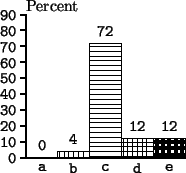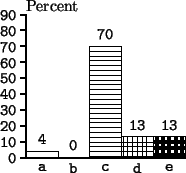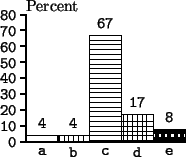|
|
|
|||||||||||||||
|
|
||||||||||||||||
|
Homepage > Assessment > Logic > Question 6 |
||||||||||||||||
|
|
||||||||||||||||
|
|
Philosophy
103: Introduction to Logic
Answer Choices: a. This inductive inference, all New York police officers are honest, although theoretically possible, is not warranted. b. This answer is possible if the meaning of the term "honest" shifts, and one assumes that "pure" or complete "honesty" is not possible. If terms cannot be instantiated, we cannot converse. c. Although some New York police officers might not be honest, this conclusion does not follow logically from the discovery that some New York police officers are honest. d. Statement d logically follows because it is the obverse of the given statement. Obversion always results in an equivalent statement; hence, answer d is the best. e. This answer, while probably true on other grounds, does not logically follow from the given statement. Evaluation: The answers to this question are is consistent across the disciplines. This type of question quite probably will show a substantial difference in assessment outcomes between logic and other courses when logic students begin to be aware of conversational implication. |
||||||||||||||
|
Send corrections or suggestions to webmaster@philosophy.lander.edu |
||||||||||||||||
|
Arguments | Language | Fallacies | Propositions | Syllogisms | Translation | Symbolic |
||||||||||||||||
|
|
. |
|
||||||||||||||



